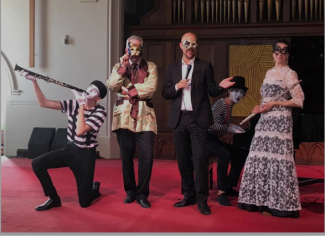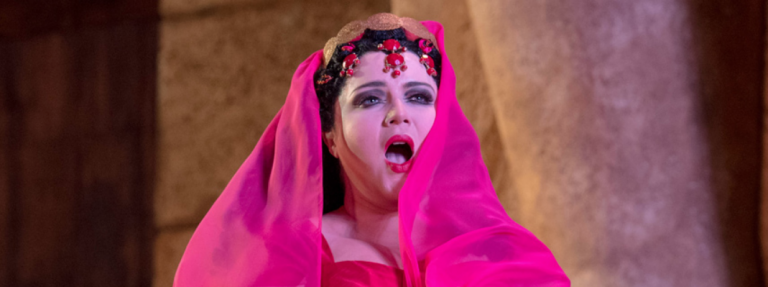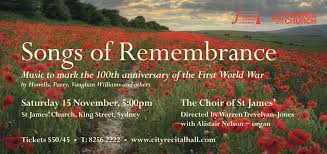Concert Review: Salon Société/ Twilight Musical Dialogues

Salon Société,
Musical Luminati Series, Twilight Musical Dialogues
Adamstown Uniting Church, Newcastle
30 November, 2018
Adamstown Uniting Church, Newcastle,
The final instalment of the Twilight Musical Dialogues’ 2018 series Musical Luminati, entitled Salon Société Omega Ensemble members Sally Walker on flute, David Rowden on clarinet and Clemens Leske on piano. Inspired by the French Salon tradition, Salon Société comprised French and French-inspired works by Gabriel Fauré, Francis Poulenc, Erik Satie, Camille Saint-Saëns and young Australian, Gerard Nicholls. As a beaming sunset illuminated the church through brilliant stained-glass windows, the opulently dressed audience, many of whom enhanced their merry mood with a mask and a complementary glass of wine, served amongst Marcel Marceau mime artist ushers, readied themselves to be entertained by the coruscating program of music ahead.
As the three performers ambled elegantly onto the stage with their respective masques, they introduced and welcomed the audience to the music. Gabriel Fauré’s representative work Pavane Op. 50, arranged for flute, clarinet and piano by Corinna Söller, came to life in this intimate live setting, the gentle rippling pulse from the staccato piano accompaniment, provided the fertile grounding for the mellifluous woodwind melodies to disperse through the concert venue and hypnotise the audience. All three musicians performed with collective grace.
Francis Poulenc’s Sonata for flute and piano, FP 164, performed by Walker and Leske was introduced with a rather gruesome tale, as told by Walker, of the murdered Carmelite Nuns, who were the theme of his opera “The Dialogue of the Carmelites”, written at the same time as this sonata (bearing in mind that the 19th century French Salon tradition coincided with the French Revolution). There was a surreal anecdote that Poulenc suspected the spirit of one of these nuns was summoned in the second movement. This sonata, in three movements: Allegretto Malincolico, Cantilena: Assez lent and Presto Giocoso, contains an ethereal silvery melodic motif which formed a pillar between moments of instrumental virtuosity on both instruments. Walker and Leske performed with gusto, wit, contemplation, and joyousness; an enigmatic concoction of moods which almost did exude a supernatural presence in the room.
Erik Satie’s emblematic work Gymnopédie No.1 for solo piano, performed by Leske, was next. As a prologue to this performance, Leske discussed how this work encapsulates the heartache that Satie experienced in his lifetime, which, in a way, recapitulated an underlying theme in a previous Twilight Musical Dialogues concert from 2017 entitled Russia, where Elena Kats-Chernin’s music meditated on Satie’s life-long melancholy as endorsed by a broken heart. Leske performed this work with the sensitivity, bittersweetness. The reverie for which it is known was made all-the-more poignant and engaging by the reminder of Satie’s morose disposition.
Poulenc’s Sonata for Clarinet and Piano, FP 184 performed by Rowden and Leske, featured an implacably wide dynamic range, spell-binding virtuosity and seamless tightness between the instruments. Much like the Sonata for flute and piano, FP 164 which preceded it, this clarinet and piano sonata comprised an uncompromisingly rich brew of sentiments including angst, thrill, anticipation, excitement and release, making for a stirring and pulsating performance.
Featured Young Artist for the night was Central Coast-based Australian composer Gerard Nicholls. His Crépuscule, (French for Twilight) received its premiere. Composed for flute, clarinet and piano, this work was introduced with small melodic themes which developed incrementally with instrumental curlicues and exchange of dialogue between the performers. This work and its performance was a spacious, ethereal and invigorating experience.
The final work was Tarantella Op.6 by Camille Saint-Saëns for flute, clarinet and piano. Appropriately prefaced with a reminder of the current Australian “spider season”, this vivacious work, with its impressively tight ensemble work, seamless virtuosity, charismatic showmanship, electrifying tension and resolution left the audience no less than exhilarated. If the Tarantella didn’t scare the redback spiders away, the thunderous applause at the end almost certainly would have (we hope).
The audience was treated with an encore performance of Erik Satie’s Gymnopédie No. 3, arranged for flute, clarinet and piano by Walker. This rather more tranquil work, with its lilting melodies, folding harmonies and calming piano accompaniment was the perfect finish to this thrilling concert and, indeed, the concert series. Musical Luminati has been a great gift to Newcastle (and beyond) with its capacity to support live chamber music performers, create opportunities for emerging young artists and its unfailing positive force of bringing lovers of music together. Innovative and entertaining series such as these, illustrate the incontrovertible relevance music has in mitigating the fast-paced lifestyle of today, offering respite, adventure and edification for music makers and audiences alike.
Joseph Asquith for SoundsLikeSydney©





